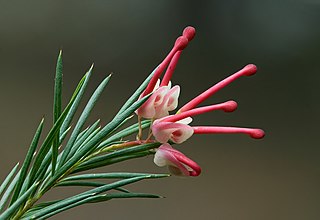
Grevillea rosmarinifolia, the rosemary grevillea, is a plant of the family Proteaceae.

Grevillea aspleniifolia, in the family Proteaceae, is endemic to New South Wales, Australia.
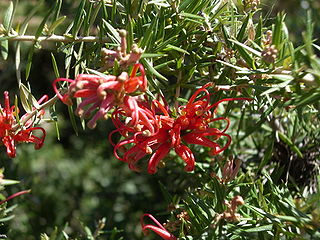
Grevillea juniperina, commonly known as juniper- or juniper-leaf grevillea or prickly spider-flower, is a plant of the family Proteaceae native to eastern New South Wales and south-eastern Queensland in Australia. Scottish botanist Robert Brown described the species in 1810, and seven subspecies are recognised. One subspecies, G. j. juniperina, is restricted to Western Sydney and environs and is threatened by loss of habitat and housing development.
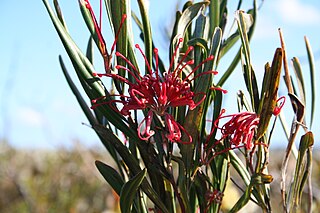
Grevillea oleoides, also known as red spider flower, is a shrub which is endemic to New South Wales in Australia.
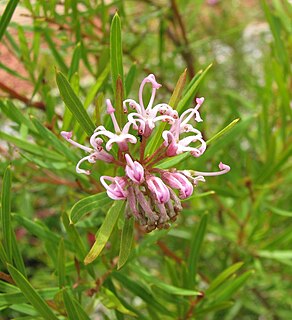
Grevillea sericea, commonly known as the pink spider flower, is a shrub endemic to New South Wales, Australia.
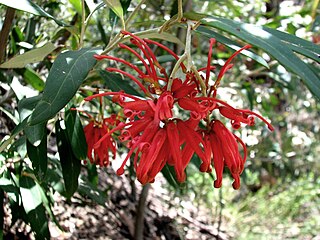
Grevillea victoriae, also known as royal grevillea or mountain grevillea, is a shrub which is endemic to south-eastern New South Wales and mountainous parts of Victoria in Australia.

Grevillea rhyolitica, also known as Deua grevillea, is a shrub which is endemic to south-eastern New South Wales in Australia. It grows to between 0.5 and 2 metres in height.

Grevillea oldei is a shrub which is endemic to New South Wales in Australia.

Grevillea iaspicula, also known as Wee Jasper grevillea, is species of endangered shrub that is endemic to southern New South Wales.

Grevillea rivularis, the Carrington Falls grevillea, is a shrub species which is endemic to New South Wales, Australia.
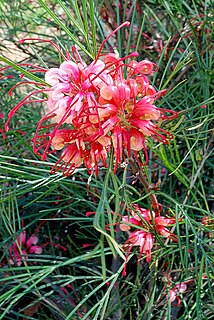
Grevillea johnsonii is a shrub species which is endemic to New South Wales in Australia.

Grevillea irrasa is a shrub species which is endemic to New South Wales in Australia. It has a spreading to erect habit, growing 1.5–3 metres high. Flowers appear between August and January in its native range. These are red, apricot or pink.
Grevillea epicroca is a shrub species that is endemic to south-eastern New South Wales in Australia. It grows up to 2.5 metres high and produces clusters of red flowers between November and May in the species' native range. It was first formally described by Val Stajsic and Bill Molyneux, their description published in Flora of Australia in 2000.
Grevillea diminuta is a shrub species that is native to New South Wales and the Australian Capital Territory, Australia. It was first formally described by Lawrie Johnson in 1962.
Grevillea linsmithii is a shrub species that is native to New South Wales and Queensland in Australia. It was first formally described by Don McGillivray in 1986. The type specimen was collected from Mount Greville in Queensland in 1973. The species is listed as "Endangered" in Queensland under the Nature Conservation Act 1992.

Persoonia hirsuta, commonly known as the hairy persoonia or hairy geebung, is a shrub native to New South Wales in eastern Australia.
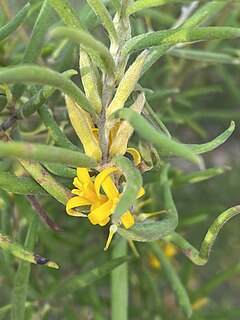
Persoonia mollis is a shrub endemic to New South Wales in eastern Australia. It is one of the many species authored by Robert Brown.
Grevillea scortechinii, commonly known as the black grevillea, is a shrub which is endemic to Queensland and New South Wales in Australia.
Grevillea wilkinsonii, commonly known as the Tumut grevillea, is a shrub which is endemic to a small area of the South West Slopes, New South Wales in Australia.

Grevillea ramosissima, commonly known as fan grevillea, is a shrub species of the family Proteaceae. It is native to south-eastern Australia.
















